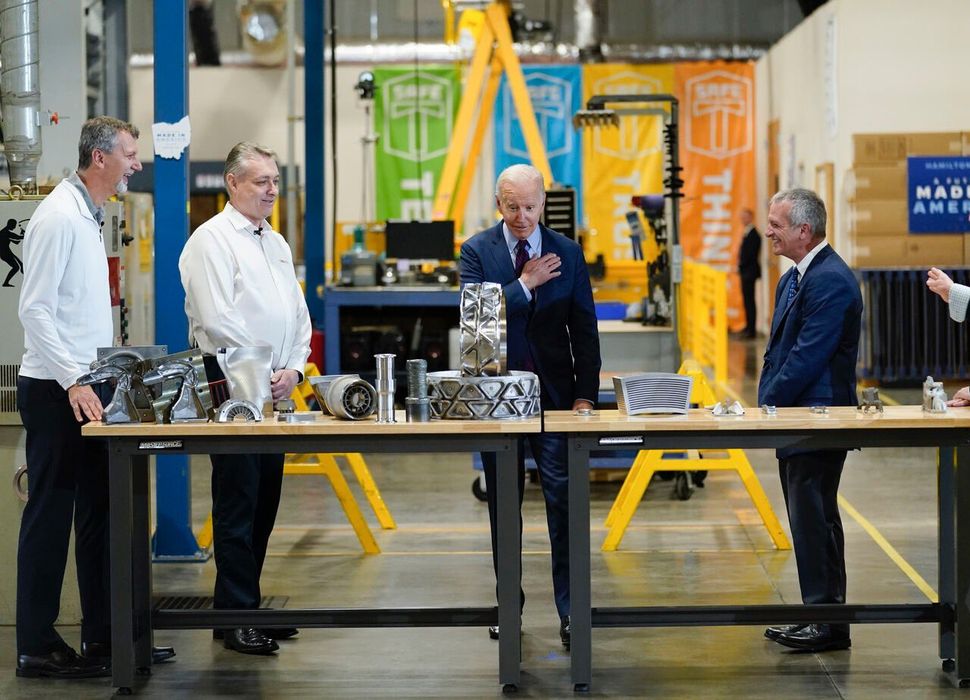
The program aims to revitalize U.S. manufacturing by driving the wider adoption of 3D printing.
U.S. President Biden has announced a major new 3D printing initiative, AM Forward, for advancing additive manufacturing (AM) across small and medium-sized enterprises (SMEs). As a voluntary pact between large manufacturers and SMEs, the program looks to leverage AM technologies for revitalizing U.S. manufacturing, in turn strengthening brittle supply chains.
Smaller manufacturers often lack resources for embracing AM’s workflows, costing, training, materials and design processes. The U.S. Administration plans to invest in regional manufacturing ecosystems to help overcome challenges that have previously hindered widespread 3D printing adoption. Federal programs will be introduced to increase the competitiveness of SMEs through access to capital, technical assistance and workforce training. For example, America Makes will assist in the upskilling of AM Forward participants, and will reportedly launch AM apprenticeship programs in association with the U.S. Department of Labor. AM Forward will be backed by the Applied Science & Technology Research Organization (ASTRO), a non-profit organization.
Through AM Forward, larger companies will commit to ordering AM parts from these smaller suppliers—as a result, boosting demand for regional AM activity. These leading manufacturers will further support SME adoption of additive capabilities by offering training, providing technical assistance, and engaging in standards development. Initial participants in the program include industry giants like GE Aviation, Honeywell, Lockheed Martin, Raytheon and Siemens Energy.
Biden is also calling on Congress to pass the Bipartisan Innovation Act, which supports new technologies like 3D printing, invests in domestic manufacturing hubs, and increases funding for Manufacturing USA Institutes and the Manufacturing Extension Partnership.
Understandably, the AM industry is reacting to the news with excitement.
“The AM Forward program is further validation of the urgent need to rebuild agile manufacturing capabilities in the U.S. We’re at an undeniable inflection point—bringing digital manufacturing to U.S. businesses will be a critical component to the success of the American economy both now and into the future,” said Ellen Kullman, CEO of Carbon. “The administration’s acknowledgment of 3D printing to boost the economy is a solid step forward and a proof point that digital manufacturing is critical in addressing our ongoing supply chain challenges and beyond.”
Desktop Metal is another industrial 3D printer manufacturer with praise for AM Forward. “Additive manufacturing has long held the potential to de-risk supply chains and enable new innovations,” said Ric Fulop, CEO of Desktop Metal, in a press release. “With manufacturing reshoring already accelerating as a result of the historic supply chain disruption caused by the COVID-19 pandemic, the AM Forward initiative is a timely and progressive approach to modernizing our nation’s outdated manufacturing infrastructure with cutting-edge technologies that will help ensure that the work stays here for the long-term.”
Engineering.com also caught up with Phil DeSimone, co-founder of Carbon, for his insights.
Engineering.com: What are your thoughts on AM Forward?
Phil DeSimone: What we discovered across the last couple years—in particular through a pandemic, as well as through the global supply chain challenges—is that additive can bring an important piece to the puzzle to get around that. We discussed our work in the early days and what we were able to do to help with masks and printing swabs when there were those massive shortages. As we’re starting to see now in the global supply chain side of things, when manufacturing is beholden to singular locations in the globe and something goes wrong in those locations, to keep our economy going and our lives functioning becomes really difficult.
I think you’re going to start to see a refocus towards local for local manufacturing, geolocation for geolocation manufacturing, and moving away from globalization. I don’t think it will die, but essentially, the idea would be that you can do this anywhere and create factories extremely quickly, and help prevent something like this from happening in the future.
What does AM Forward mean for the economy and consumers?
For the economy, I think it will ultimately create more jobs and factories in domestic locations. When I think about particularly what this means for the United States, I think you’re going to see a lot more emphasis on buying from North America, which will help appreciate jobs here. For consumers, it means that they won’t have the same impacts on supply shortages. The ability of getting things faster will be key. Massive supply and demand issues that are increasing car prices, et cetera, should decline or at least have more protection against them. Hopefully, I think this is a win-win for everybody.
Read more at ENGINEERING.com
